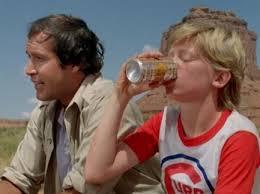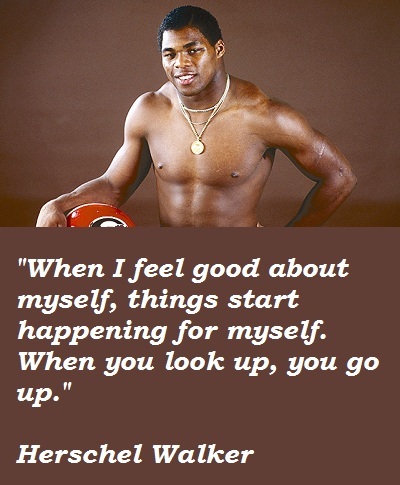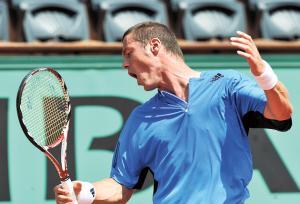Rob Bell's Blog, page 27
October 16, 2015
3 ways to prevent the big meltdown…
I took a few steps to my right at second base to field a simple ground ball. I dropped it… Run scored, game over! I then proceeded to punch the brick wall of the dugout before getting on the bus, I probably broke it (my hand, not the wall), I don’t remember. All I know is that I now wouldn’t play the next game.
Mistakes happen, errors and failure are a painful part of the game. But, what happens next is still most important. The next play or the next day.
The Texas Rangers had an epic meltdown in Game 5 of the series with 3 consecutive infield errors soon followed by a 3-run homer. I felt bad for Elvis Andrus.
The Bartman incident in 2003 with the Cubs, led to a meltdown by Alou, followed by a walk, followed by a base hit, then a crucial error by short-stop Gonzalez.
Boise State lost to Nevada in 2010, by missing a 26 yard FG in regulation, then missing a 29 FG in OT.
Meltdowns are like a huge wave crashing into the shore. One mistake leads to another. There is a science behind the collection of mistakes. Catastrophe theory.
One mistake and the adrenaline and anxiety tip past the point of return. Then there becomes an extreme drop off in performance, hence, catastrophe. These meltdowns occur in bigger moments because as the importance of the situation increase, so does the overall anxiety level. Mistakes earlier in competition can be let go of easier, because there’s still a lot of game to be played.
Here are three ways to prevent the Big Meltdown
Use the Time-Out
Once the error happens later in the game, use the time-out! Coaches can ease the tension and uptightness by making the transition from problematic to relaxed. Rallying the troops means to assemble everyone and bring order. The time-out allows this to happen. Too often, this gets overlooked.
During the time-out, reinforce the belief and poise in the players and team. Have them own the awareness that it’s not about the setback, it’s about the comeback. So what? Next play.
Remove the emotion
During stressful and emotional situations, we revert to how we trained! If we have practiced remaining calm, breathing, refocusing, then we will implement these skills when they are needed. These skills are the best at removing the emotional situation and focusing on making the next play. Mental Toughness prevents the big meltdown. To keep your head when others are losing theirs.
Listen to the cock-pit recording as Captain Sullenberger experienced the depth of emotions when his plane struck the gaggle of birds shortly after take-off in New York. He remained calm as a hindu cow, because his training allowed him to re-focus on the task at hand, successfully landing the full plane with no power in the most populated area in the entire world.
Have a Plan
Short-term, process goals create focus. Long-range, outcome based goals create stress. After a mistake, using the time out, and removing the emotion, what’s our plan? Short-term goals like make a stop, get an out, knock it down, throw a good pass, aggressive serve, etc. What’s the immediate goal?
Larry Bird stealing the in-bound pass or Reggie Miller scoring 8 points in nine seconds both had an immediate focus on the goal, make a play!
Check out our next book on Mental Toughness- Don’t Should on Your Kid: Build Their Mental Toughness
September 22, 2015
Don’t “should” on Your Kid: Build Their Mental Toughness
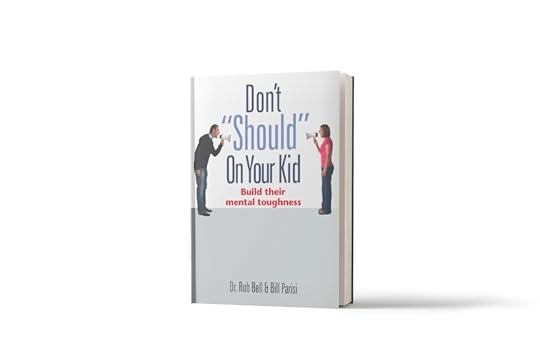
Parents & coaches. We are excited to announce the release of our 4th book on mental toughness. It’s here to help you help your child build mental toughness.
Sign-up for pre-release here…http://bit.ly/1iOP9qy
September 11, 2015
Why I hate koala bears (and you should to)

I hate things that aren’t what they appear to be. I am a wash and wear kind of guy.
I’ve had a few famous idols in my life and was unlucky enough to meet them all. They never lived up to my expectations.
I still get caught up in appearances as much as anyone. It bothers me when I encounter athletes that look like a demigod, but don’t have mental toughness. They may be the fastest on the field, but lack that all important “it” factor. George Foreman once stated “ Big guys have everything, except motivation.”
Koala bears fit the mold of not what they appear to be. I thought they were cute until I pulled back the curtain and exposed the wizard.
First of all, they aren’t even bears, they are marsupials.
Koala’s sleep over 20 hours in the day. They are lazy! Anyone actually see them moving around in a zoo?
Over 90% of Koala’s have chlamydia! Gross to even think about, but it’s also the biggest control to their population.
Koala’s are incontinent, they are constantly peeing all over themselves, probably while they sleep too. Can’t be a pleasant smell.
As if you need one more reason, baby’s feed on their mother’s “pap,” that’s short for poop I think. The babies actually eat their mother’s diarehea. Sorry I had to mention it.
Rats on the other hand are NOT cute, but they are tough. You know what you’ll get with a rat. I’ll take a rat any day of the week. Rats get a bad rap as snitches. Odd moniker, but it stuck. If I had a college mascot, I would actually name them the Rats.
Rats are an animal that can tread water for over 24 hours.
They can chew through lead pipes and cinder blocks and run on telephone wires.
They carry around a tail the length of their body and can fit through almost any hole.
They can run up to 24 mph. That’s fast!
95% of the animals tested in laboratories are rats and the one mammal that could survive a nuclear explosion.
Rats even have one of the best kids movies of all-time, Ratatouille. Koala bears don’t have that.
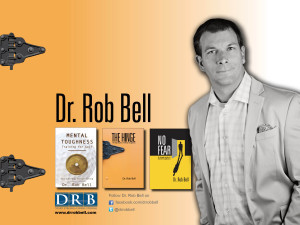 Dr. Rob Bell is a Sport Psychology coach. DRB & Associates based in Indianapolis works with professional athletes & corporate athletes, coaches, and teams building their Mental Toughness. His 2nd book is titled The Hinge:: The Importance of Mental Toughness
Dr. Rob Bell is a Sport Psychology coach. DRB & Associates based in Indianapolis works with professional athletes & corporate athletes, coaches, and teams building their Mental Toughness. His 2nd book is titled The Hinge:: The Importance of Mental Toughness
 Follow on twitter @drrobbell or contact drrobbell@drrobbell.com
Follow on twitter @drrobbell or contact drrobbell@drrobbell.com
Check out the new film & e-book, NO FEAR: A simple guide to mental toughness .
September 4, 2015
How to end it…
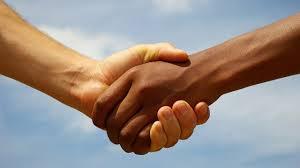
I would never said goodbye at any party or wedding. I always left exactly the same way. I hated giving the formal goodbye, because people never let you leave without some sort of guilt play. So, I would duck out the door. No goodbye. Like ripping off a band-aid.It’s probably how most people do it today in real life. No two-weeks notice, no official break-up, and especially not face to face. Just a text.
My daughter hates that I’ve implemented the principle of how we end everything. We Thank the Coach! She is six and starting to get it.
Coaches and mentors are the most important person in our lives. Everyone needs a coach!
Coaches Mark James and Brain Satterfield end practice the same way, they shake each player’s hand. Simple, yet powerful. NO matter the type of practice or outcome of game, the ending is the same. It was created as a way to put any type of closure to a good or poor day, a way to END it positive.
Players even started looking forward to it. The worst punishment coach could ever deliver is telling one of their players, “I don’t want to see you after practice.” They got it together pretty quick.
A positive ending is essential because we can’t know the last time we are ever going to see someone. Travis Smith played golf at Ball State and I distinctly remember seeing him at practice before I left for Nashville. I don’t recall saying goodbye… He died in a car accident in 2007. There’s no amount of money his parents wouldn’t have given to spend just a few more moments with him.
Money isn’t the most precious resource, its time. Make sure you end everything with a handshake and a thank you.
 Dr. Rob Bell is a Sport Psychology coach. DRB & Associates based in Indianapolis works with professional athletes & corporate athletes, coaches, and teams building their Mental Toughness. His 2nd book is titled The Hinge:: The Importance of Mental Toughness
Dr. Rob Bell is a Sport Psychology coach. DRB & Associates based in Indianapolis works with professional athletes & corporate athletes, coaches, and teams building their Mental Toughness. His 2nd book is titled The Hinge:: The Importance of Mental Toughness
 Follow on twitter @drrobbell or contact drrobbell@drrobbell.com
Follow on twitter @drrobbell or contact drrobbell@drrobbell.com
Check out the new film & e-book, NO FEAR: A simple guide to mental toughness .
August 28, 2015
Mental Helplessness
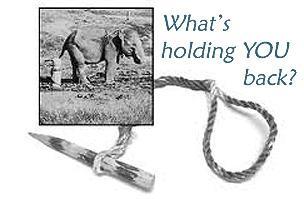 I asked Archie Manning and Andre Agassi to read my next book and provide testimonials, because they would be perfect for its message to parents. I got through to their agents, they said, “no.” Andre Agassi has denied my request three times now. I hate rejection, check that, my ego hates rejection. Dr. Seuss was rejected 27 times, his ego must not have got in the way.
I asked Archie Manning and Andre Agassi to read my next book and provide testimonials, because they would be perfect for its message to parents. I got through to their agents, they said, “no.” Andre Agassi has denied my request three times now. I hate rejection, check that, my ego hates rejection. Dr. Seuss was rejected 27 times, his ego must not have got in the way.
What takes place in my mind after losing, or getting rejected is that feeling that I’m not good enough. The setback just affirms that belief, “see, here’s the proof.” Gym owner and coach, Tyler Miller, of Force Barbell knows when someone isn’t going to make a certain lift, because their approach to the lift is different.
Feeling helpless is learned. Having limiting beliefs are learned. We set up our own mental barriers about how good we will be.
PIKE syndrome
A study was done with Pike fish in a tank, where they released minnows and watched as the Pike gobbled them up. Then , they placed the minnows inside of a jar so the Pike could not get to it. It still went after it, nailing the glass jar time and time again. After a period of time, the jar was removed and the minnows swam freely, meaning the Pike fish could once again feast…This time, the Pike fish did nothing! It stayed there, and eventually starved to death! The power of nature didn’t allow the fish to survive.
The Pike syndrome has to be at least 10x stronger for us humans.
How many roads must a man walk down, before you call him a man? – Bob Dylan
Self-imposed limiting beliefs are everywhere. For example, “you’re good, but not that good?” “she’s pretty, but you’re just okay?”
If we are unaware of our identity and our mission, then the limiting beliefs will still arise and keep us from reaching our full potential. It’s a mental tether.
Baby Elephants
As a means of training an elephant, when they are very small, they are tethered by a thick rope to a stake in the ground. As a baby, it lacks the strength to break free, so eventually, it stops trying. Even when the elephant is large enough and could easily break the rope around its leg, it refuses to do so. The massive size of an elephant learned to be helpless.
Dogs & Electric Shocks
Seligman was the first to coin the phrase learned helplessness. I highly recommend his book Authentic Happiness: His experiment with dogs exposed them to electric shocks, in which they could not escape. After the dogs actually had an out and could escape the shocks, just like the elephant and the Pike fish, they did nothing. The dogs had to be physically removed, no amount of rewards, or praise would get them to leave the shocks. They learned helplessness.
If you want it bad enough, you have to BELIEVE. More importantly, we’ll have to go through our own shocks, mental tethers, and glass jars. These are the times of non-belief that determine if we will remain steadfast and eventually break free.
 Dr. Rob Bell is a Sport Psychology coach. DRB & Associates based in Indianapolis works with professional athletes & corporate athletes, coaches, and teams building their Mental Toughness. His 2nd book is titled The Hinge:: The Importance of Mental Toughness
Dr. Rob Bell is a Sport Psychology coach. DRB & Associates based in Indianapolis works with professional athletes & corporate athletes, coaches, and teams building their Mental Toughness. His 2nd book is titled The Hinge:: The Importance of Mental Toughness
 Follow on twitter @drrobbell or contact drrobbell@drrobbell.com
Follow on twitter @drrobbell or contact drrobbell@drrobbell.com
Check out the new film & e-book, NO FEAR: A simple guide to mental toughness .
August 21, 2015
A participation trophy doesn’t build mental toughness
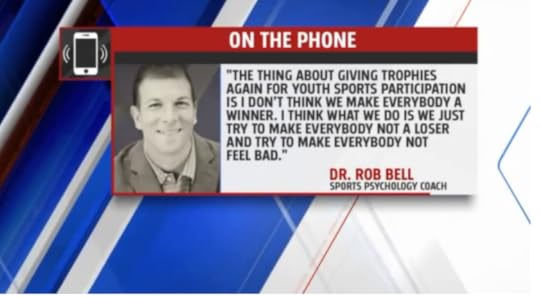 FOX 59 interviewed me… click on the image above to watch the story…
FOX 59 interviewed me… click on the image above to watch the story…
Trophies don’t mean anything. Many Olympians have their Gold medals in a sock drawer. We give meaning to the trophy and what it represents.
Olympians didn’t participate for a medal, it was not the driver. They wanted to test themselves against the best. Their own mental toughness and talent are the reasons for their success.
When we give kids trophies for participating, it is more about the adults than it is the kids.
I doubt if even one kid ever began to play sports because they thought, “Hey, I get a trophy at the end.” They play for the fun, and the capri sun.
Awarding participation trophies actually can do more harm than good.
We think that providing an external reward for hard work will build motivation, but the opposite may be the case. It may diminish their motivation. Is it a reason why 80% of kids stop playing by age 14? Not sure.
Yale researcher, Amy Wrzesniewski examined the motives of over 11,000 West Point cadets across the span of 14 years. They wanted to assess the impact of cadets “why” for entering the academy. Cadets that had internal motivators were more likely to graduate, receive promotions, commissions, and stay in the military. Cadets that entered with BOTH strong internal and external motivators (such as get a good job later in life) revealed drastically less success.
The external factors such as get a better job and make more money had a negative impact on overall success.
Think about it, we all have different internal motivators and are more likely to accomplish a task when we tap into our own “why” rather than a carrot or stick approach. (i.e., I find a wallet- I’ll return the wallet because it’s the right thing to do, rather than the possible reward I could get.)
Adults don’t need to give trophies to Kids for participating, they just need praise their effort and allow them to have fun and also fail. We don’t make everyone a winner by making everyone not a loser. It may even create more losers.
 Dr. Rob Bell is a Sport Psychology coach. DRB & Associates based in Indianapolis works with professional athletes & corporate athletes, coaches, and teams building their Mental Toughness. His 2nd book is titled The Hinge:: The Importance of Mental Toughness
Dr. Rob Bell is a Sport Psychology coach. DRB & Associates based in Indianapolis works with professional athletes & corporate athletes, coaches, and teams building their Mental Toughness. His 2nd book is titled The Hinge:: The Importance of Mental Toughness
 Follow on twitter @drrobbell or contact drrobbell@drrobbell.com
Follow on twitter @drrobbell or contact drrobbell@drrobbell.com
Check out the new film & e-book, NO FEAR: A simple guide to mental toughness .
Participation trophies doesn’t build mental toughness
 FOX 59 interviewed me… click on the image above to watch the story…
FOX 59 interviewed me… click on the image above to watch the story…
Trophies don’t mean anything. Many Olympians have their Gold medals in a sock drawer. We give meaning to the trophy and what it represents.
Olympians didn’t participate for a medal, it was not the driver. They wanted to test themselves against the best.
When we give kids trophies for participating, it is more about the adults than it is the kids.
I doubt if even one kid ever began to play sports because they thought, “Hey, I get a trophy at the end.” They play for the fun, and the capri sun.
Awarding participation trophies actually can do more harm than good.
We think that providing an external reward for hard work will build motivation, but the opposite may be the case. It may diminish their motivation. Is it a reason why 80% of kids stop playing by age 14? Not sure.
Yale researcher, Amy Wrzesniewski examined the motives of over 11,000 West Point cadets across the span of 14 years. They wanted to assess the impact of cadets “why” for entering the academy. Cadets that had internal motivators were more likely to graduate, receive promotions, commissions, and stay in the military. Cadets that entered with BOTH strong internal and external motivators (such as get a good job later in life) revealed drastically less success.
The external factors such as get a better job and make more money had a negative impact on overall success.
Think about it, we all have different internal motivators and are more likely to accomplish a task when we tap into our own “why” rather than a carrot or stick approach. (i.e., I find a wallet- I’ll return the wallet because it’s the right thing to do, rather than the possible reward I could get.)
Adults don’t need to give trophies to Kids for participating, they just need praise their effort and allow them to have fun and also fail. We don’t make everyone a winner by making everyone not a loser. It may even create more losers.
 Dr. Rob Bell is a Sport Psychology coach. DRB & Associates based in Indianapolis works with professional athletes & corporate athletes, coaches, and teams building their Mental Toughness. His 2nd book is titled The Hinge:: The Importance of Mental Toughness
Dr. Rob Bell is a Sport Psychology coach. DRB & Associates based in Indianapolis works with professional athletes & corporate athletes, coaches, and teams building their Mental Toughness. His 2nd book is titled The Hinge:: The Importance of Mental Toughness
 Follow on twitter @drrobbell or contact drrobbell@drrobbell.com
Follow on twitter @drrobbell or contact drrobbell@drrobbell.com
Check out the new film & e-book, NO FEAR: A simple guide to mental toughness .
August 14, 2015
Why I quit drinking…
My wife told me the other day that my son had me under his thumb. It was always my daughter before. Funny thing about boys is how much they emulate their daddy. I love coffee, so he loved coffee. I would have a pint in the evening and so would he (okay, he’d have a sip). He was three. It was funny.
But I noticed something scary. He wanted another sip and another and another. Alcoholism runs rampant in my family and I could already tell he had the sickness. My grandfather actually has the second longest living sobriety date of 54 years in the U.S. It was confirmed at the national convention.
When I was younger, I wasn’t an alcoholic. I mean I only fell off of a cliff and was involved in a drunk driving accident during college in the same year. Some people said I was lucky, some said I was very unlucky. Some said I was meant for much more in life. The tough part was that it had cost me playing baseball in college. I could have hurt someone else, and I never wanted that, but I didn’t think about those things.
After those mistakes, I had to attend all the alcohol classes, AA meetings, perform 100 hours of community service, and meet regularly with a probation officer. The probation officer would give me a breathalyzer every time I would show up. I always wondered, “Who in the hell would show up drunk when they had to give a breathalyzer?” She said, “You’d be shocked.” I had a sheet of paper that needed to be signed to confirm my attendance at all of the AA meetings. I learned, “Hey this is anonymous”! I just had people at dorms sign the sheet instead of going to the meetings. I remembered in those meetings thinking that these people were messed up, I wasn’t that bad. I focused on the differences between us, rather than the similarities.
Even after all of that for many years, I still drank. I just managed my drinking. I never liked liquor, I was a 2 or 3 pint man, well, most of the time. I simply loved having fun and drinking beer was just a part of it. Games, concerts, parties, BBQ’s, at the beach, after golf, during golf, at dinner, with friends, at the movies, hanging out, writing, chess, after runs, were all great times to have a cold one.
After my kids were born, I actually started to look forward to a craft pint in the evenings to unwind. It occupied my mind about wanting a beer.
I admired people who didn’t drink. People that had issues with drinking and no longer drank. I always thought that those who never drank were the lucky one’s. I actually wanted to be the person who didn’t need to have a drink. That is my beautiful wife, take or leave it, no problem.
I’m an all or nothing guy. If I have one, I’m gonna have two. A saying that resonated with me “One is too many and 10 is never enough.” The only path for me was not having one. It’s tough because it still looks appealing, but it forces me to remember my why, my gratitude list, my role as a father, and the benefits. That’s mental toughness. For example, we went to a wedding last week and the ride home with my kids was incredible, we blasted the music and sang aloud. Before quitting, I wouldn’t have driven home.
There is a saying that if you want “To attain knowledge, add things everyday. To attain wisdom, remove things every day.” I know my goals and I have never once written down drinking as part of the plan. Sometimes quickly, sometimes slowly, It took me a long time to realize that sacrificing short-term gratification for long-term and big picture satisfaction is best for me. And this is just one part of my life.
I even became fearful writing this and thought, “what-if” I go out tonight and drink? Wouldn’t I be a fraud and a failure? Just in case I mess up, maybe its best not to write this post. We are all going to mess up, but it’s not about the setback, it’s about the comeback. When we mess up, we just start over, but I’m going to try to not let fear win. Taking things one day, one moment, at a time is what it takes for success in anything.
 Dr. Rob Bell is a Sport Psychology coach. DRB & Associates based in Indianapolis works with professional athletes & corporate athletes, coaches, and teams building their Mental Toughness. His 2nd book is titled The Hinge:: The Importance of Mental Toughness
Dr. Rob Bell is a Sport Psychology coach. DRB & Associates based in Indianapolis works with professional athletes & corporate athletes, coaches, and teams building their Mental Toughness. His 2nd book is titled The Hinge:: The Importance of Mental Toughness
 Follow on twitter @drrobbell or contact drrobbell@drrobbell.com
Follow on twitter @drrobbell or contact drrobbell@drrobbell.com
Check out the new film & e-book, NO FEAR: A simple guide to mental toughness .
August 8, 2015
5,000 push-ups & 5,000 sit-ups every day…
Herschel Walker was made fun at school and never went out to recess because he was afraid of getting beat up. His teacher used to put him in the corner of the room because he had a speech impediment, and called him “special.” His father used to give him a quarter to buy a snack at school. Herschel would give it to another kid, so they could buy a snack as long as they would talk to him. After the kid had finished his snack, he would go back to making fun of him.
The last day of school in 8th grade, he went out to recess and got beat up, bad. He said to himself “never again….When your name is called, you have to stand up.”
Mental Toughness is often caught rather than taught. From that Hinge moment in school, he didn’t train to become a great athlete, he trained to become a super hero. How did he do it?
He did 5,000 sit-ups & 5,000 push-ups every day! Herschel also ran on a dirt track every day, with a rope tied to his waist dragging a tire.
He transformed himself from one of the slowest guys in the school, to one of the fastest in the state of Georgia by the 9th grade.
During an interview with Jim Rome, Herschel was asked when was the last day he missed a workout? He replied “NEVER.”
Sometimes, our mess becomes our message. Mental Toughness means doing what others aren’t willing to do. Dr. Rob Bell is a Sport Psychology coach. DRB & Associates based in Indianapolis works with professional athletes & corporate athletes, coaches, and teams building their Mental Toughness. His 2nd book is titled The Hinge:: The Importance of Mental Toughness
Dr. Rob Bell is a Sport Psychology coach. DRB & Associates based in Indianapolis works with professional athletes & corporate athletes, coaches, and teams building their Mental Toughness. His 2nd book is titled The Hinge:: The Importance of Mental Toughness
 Follow on twitter @drrobbell or contact drrobbell@drrobbell.com
Follow on twitter @drrobbell or contact drrobbell@drrobbell.com
Check out the new film & e-book, NO FEAR: A simple guide to mental toughness .
August 5, 2015
Don’t question your Mental Toughness
There is “no question” about it. Did this cliche’ emerge in sports? I’m not sure, it’s just where I hear it most often.
What I’ll hear from competitors is how often they question themselves. “how did I do that?” “what are you doing?” “why am I out here today?”
Mental toughness doesn’t ask questions. I don’t hear an athlete playing well, ask themselves “how are you playing so well?”
Questions during competition emerge after mistakes and make sense, but they are rhetorical, and they aren’t answered. All they do is lead to more questions or merely go unanswered.
Don’t question your own mental toughness!
Things will go bad, and we aren’t going to always play our best, so we will need to make adjustments. But, questions don’t lead to many positive adjustments, just more questions.
So, we need to give ourselves instructions about what to do NEXT.
Try statements instead.
“Okay, next play,” “wow, that wasn’t the best,” “stay aggressive,” “find a way.”
These statements can even be motivational, but I’ve found that the best make instructional adjustments. We don’t need questions about ourselves or our play, we just need to develop a habit of telling ourselves what to do next. Dr. Rob Bell is a Sport Psychology coach. DRB & Associates based in Indianapolis works with professional athletes & corporate athletes, coaches, and teams building their Mental Toughness. His 2nd book is titled The Hinge:: The Importance of Mental Toughness
Dr. Rob Bell is a Sport Psychology coach. DRB & Associates based in Indianapolis works with professional athletes & corporate athletes, coaches, and teams building their Mental Toughness. His 2nd book is titled The Hinge:: The Importance of Mental Toughness
 Follow on twitter @drrobbell or contact drrobbell@drrobbell.com
Follow on twitter @drrobbell or contact drrobbell@drrobbell.com
Check out the new film & e-book, NO FEAR: A simple guide to mental toughness .


